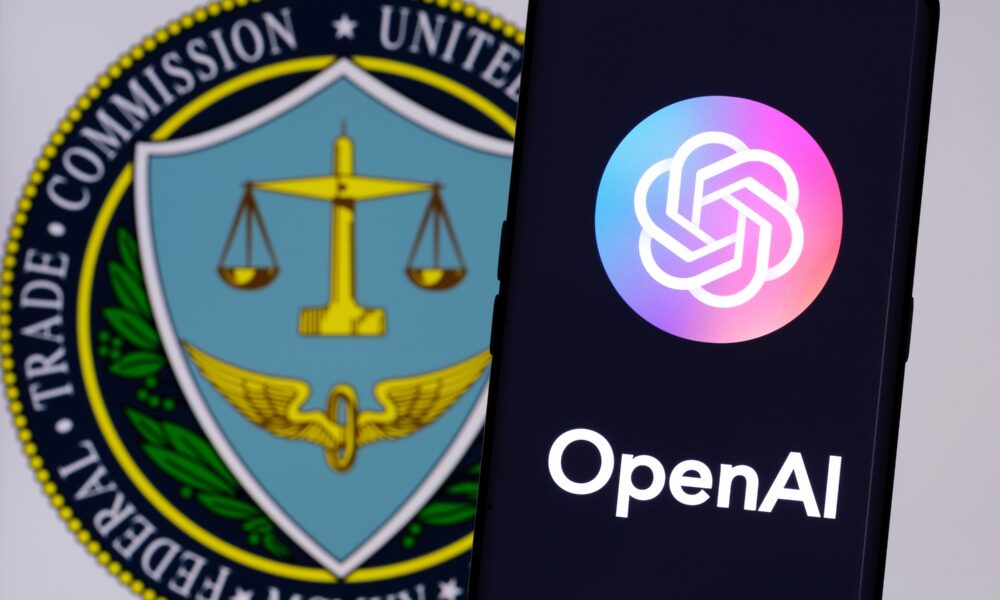OpenAI Faces FTC Investigation: Examining The Regulatory Landscape Of AI

Table of Contents
The FTC Investigation: Specific Allegations and Potential Outcomes
The FTC's investigation into OpenAI centers around several key allegations, raising serious questions about data security, consumer protection, and the potential for deceptive practices. While the specifics remain under wraps, reports suggest the investigation focuses on potential violations of data privacy laws and the potential for misleading users regarding the capabilities and limitations of OpenAI's AI models.
-
Specific Allegations: The FTC's complaint may allege that OpenAI failed to adequately protect user data, leading to potential breaches or misuse. Furthermore, concerns may exist around the potential for deceptive practices related to the outputs generated by OpenAI's AI, potentially leading users to believe the AI's responses are more factual or reliable than they actually are. The FTC might also be scrutinizing OpenAI's practices related to consent and transparency regarding data collection and usage.
-
Potential Outcomes: The potential consequences for OpenAI are significant. Depending on the findings, the FTC could impose substantial fines, demand changes to OpenAI's data handling practices through consent decrees, or even issue injunctions limiting OpenAI's operations. The outcome will set a crucial precedent for other AI companies, highlighting the importance of adhering to data privacy regulations and employing ethical AI development practices.
-
Legal Precedents and Regulations: The FTC's investigation will likely draw upon existing legal precedents related to data security, consumer protection, and deceptive trade practices. Laws like the CCPA (California Consumer Privacy Act) and the GDPR (General Data Protection Regulation), along with evolving interpretations of existing laws, will shape the FTC's approach.
-
Implications for the AI Industry: The OpenAI investigation sends a clear message to the broader AI industry: rigorous adherence to ethical guidelines and robust data protection measures are no longer optional but essential. Companies developing and deploying AI systems must proactively address potential risks and ensure transparency in their operations.
The Current Regulatory Landscape: A Patchwork of Laws and Guidelines
The current regulatory landscape for AI is best described as a fragmented patchwork of laws, guidelines, and self-regulatory initiatives. While some regions have enacted specific AI legislation, a globally harmonized framework remains elusive.
-
Existing Legislation and Regulations: The GDPR in Europe and the CCPA in California are notable examples of legislation aiming to protect data privacy, aspects crucial for AI development. However, these laws were primarily designed for traditional data processing and may not fully address the unique challenges presented by AI. Other countries and regions are developing their own AI-specific regulations, further fragmenting the landscape.
-
Gaps and Inconsistencies: A major challenge lies in the inconsistencies and gaps in existing legislation. The rapid pace of AI innovation often outpaces regulatory efforts, leading to legal uncertainties and difficulties in applying existing laws to novel AI technologies like generative AI.
-
Challenges in Applying Existing Laws: Existing laws may not adequately address issues like algorithmic bias, the spread of misinformation generated by AI, or the broader societal implications of AI deployment.
-
Self-Regulation and Industry Best Practices: While self-regulation and industry best practices play a role, they often lack the legal enforceability of formal regulations, creating a need for stronger governmental oversight.
Key Ethical and Societal Concerns Related to AI Development and Deployment
The rapid advancement of AI raises significant ethical and societal concerns that demand careful consideration. These concerns are not merely theoretical; they pose real-world risks that need proactive mitigation.
-
Algorithmic Bias and Discrimination: AI systems trained on biased data can perpetuate and amplify existing societal biases, leading to discriminatory outcomes in areas such as loan applications, hiring processes, and even criminal justice.
-
Data Privacy Violations: The collection, use, and storage of vast amounts of personal data for AI training raise significant privacy concerns, particularly in the context of generative AI models that learn from and generate human-like text.
-
Misinformation and Disinformation: AI-generated content can be used to create and spread misinformation and disinformation at an unprecedented scale, potentially undermining trust in institutions and societal cohesion.
-
Job Displacement: The automation potential of AI raises legitimate concerns about job displacement across various sectors, requiring proactive measures to address the potential economic and social fallout.
-
AI Accountability and Transparency: Determining responsibility when AI systems make errors or cause harm is a complex challenge. Ensuring transparency in the decision-making processes of AI systems is crucial for accountability and public trust.
The Need for Comprehensive AI Regulation: Balancing Innovation and Safety
The debate surrounding comprehensive AI regulation highlights a crucial tension: the need to foster innovation while simultaneously mitigating the potential risks and harms associated with AI.
-
Arguments for and Against Comprehensive Regulation: Proponents of comprehensive regulation argue that it's necessary to protect consumers, prevent harm, and ensure ethical development. Opponents express concerns that excessive regulation could stifle innovation and hinder the development of beneficial AI technologies.
-
Balancing Innovation and Safety: Finding the right balance requires a nuanced approach. Overly restrictive regulations can stifle innovation, while insufficient regulation can lead to significant societal harms.
-
Potential Approaches to Effective AI Regulation: Risk-based approaches, where regulations are tailored to the level of risk posed by different AI systems, offer a promising avenue. Sector-specific regulations, recognizing the unique challenges in different industries, may also be beneficial. Finally, international cooperation is crucial to establish globally consistent standards for AI development and deployment.
Conclusion
The FTC investigation into OpenAI underscores the urgent need for a clearer, more comprehensive, and internationally coordinated regulatory framework for AI. The current fragmented landscape leaves significant gaps in addressing ethical concerns and potential harms. Balancing the need for continued innovation with responsible AI development demands a nuanced and proactive approach from policymakers, researchers, and industry stakeholders alike. Understanding the implications of the OpenAI investigation and the broader AI regulatory landscape is crucial for all stakeholders. Stay informed about developments in AI regulation and advocate for responsible AI policies that protect consumers, promote ethical innovation, and ensure AI benefits all of humanity. Learn more about the complexities of AI safety and contribute to shaping a future where AI serves as a force for good.

Featured Posts
-
 Death Threat Against Nigel Farage Afghan Migrants Uk Journey
May 04, 2025
Death Threat Against Nigel Farage Afghan Migrants Uk Journey
May 04, 2025 -
 Will Renewed Ow Subsidies In The Netherlands Encourage More Bids
May 04, 2025
Will Renewed Ow Subsidies In The Netherlands Encourage More Bids
May 04, 2025 -
 Ajagbas Ibf Setback Analysis Of Bakole Parker Fight Implications
May 04, 2025
Ajagbas Ibf Setback Analysis Of Bakole Parker Fight Implications
May 04, 2025 -
 Immigration Starmers Strategy To Counter Farages Populist Appeal
May 04, 2025
Immigration Starmers Strategy To Counter Farages Populist Appeal
May 04, 2025 -
 Powerful Art Exhibition Launches In Athy Whats On This Week
May 04, 2025
Powerful Art Exhibition Launches In Athy Whats On This Week
May 04, 2025
